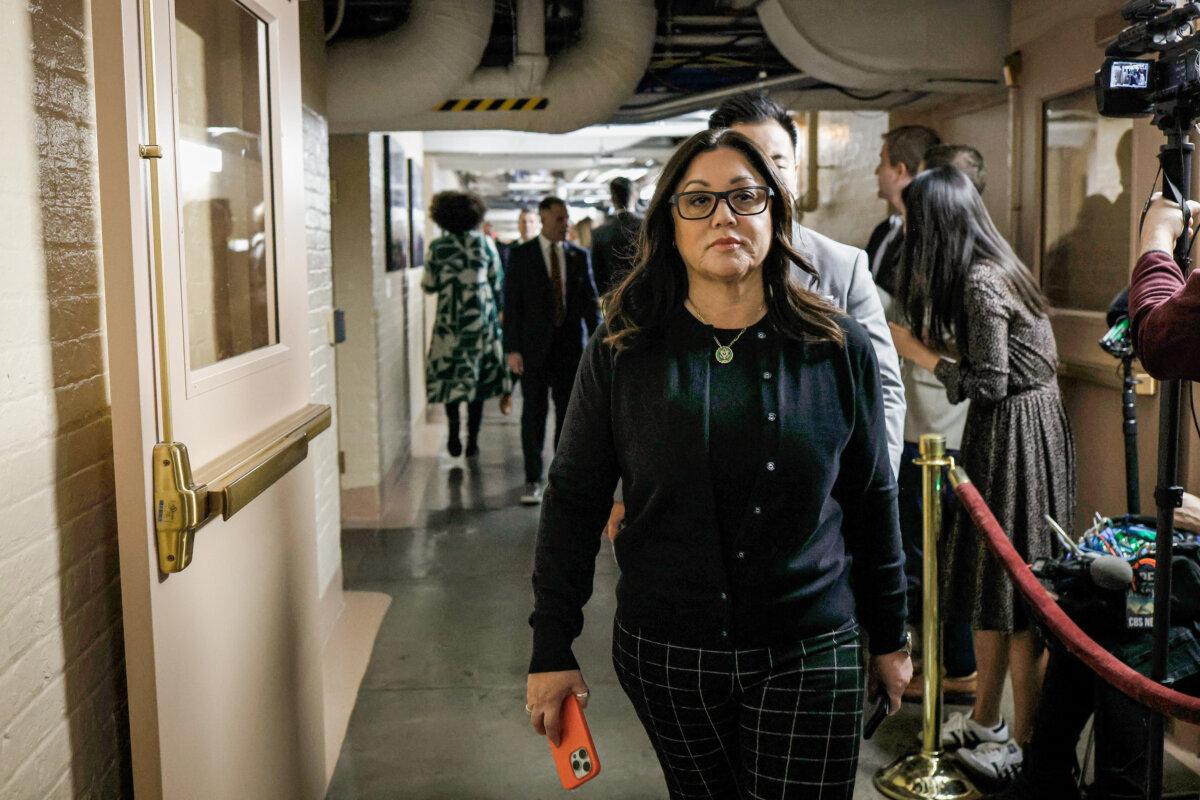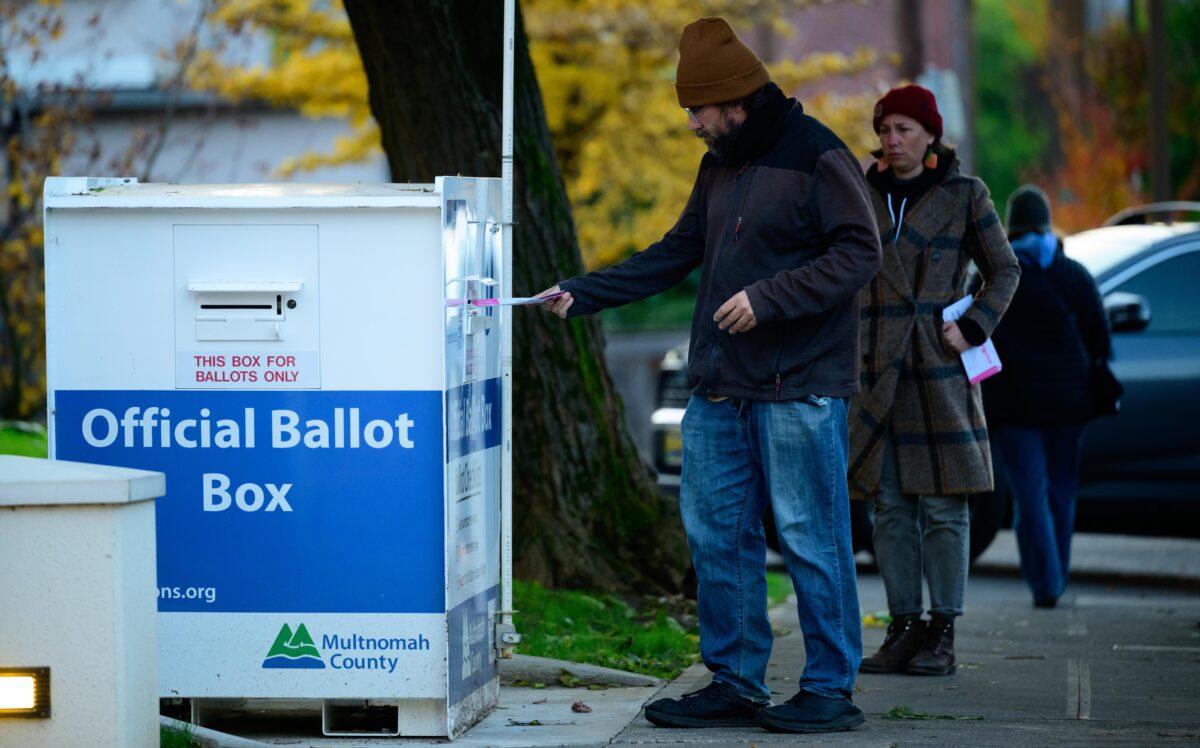With the two parties targeting three vulnerable seats, Oregon could have an outsized impact on national politics in 2024.
With three seats in play, Oregon voters could decide who controls the U.S. House of Representatives next year.
Oregon Congresswomen Andreas Salinas (CD-6) and Val Hoyle (CD-4) have made the National Republican Congressional Committee’s list of 37 Democratic seats it hopes to flip.
Meanwhile, the House Majority PAC announced that it will spend nearly $10 million on broadcast air time as Democrats try to wrest control of the state’s 5th Congressional District from freshman incumbent Lori Chavez-DeRemer.
But first, the parties must choose their candidates in the state’s May 21 primaries.
Rematch in District 5
The race for Oregon’s 5th District is one of the few races in the country that could be a true tossup in the general election, according to the Cook Political Report.
Primary candidate Oregon state Rep. Janelle Bynum is on the Democratic Congressional Campaign Committee’s (DCCC) “Red to Blue” list of 17 candidates it’s backing to challenge vulnerable House Republicans.
Ms. Bynum vows to tackle climate change, expedite housing construction, increase teacher pay and reduce class sizes, and expand the tech sector workforce, according to her campaign website.
A four-term legislator who has never run for Congress, Ms. Bynum faces primary opponent Jamie McLeod-Skinner, an attorney who has twice won Democratic nominations for Congress but lost in the general election.
Her public service began with repairing schools and hospitals in post-war Kosovo before returning to the U.S. to manage refugee resettlement.
The winner will challenge incumbent Republican Lori Chavez-DeRemer in November. The first-term U.S. Representative is one of a dozen Republicans who represent districts that Joe Biden won in 2020. Her focus is on public safety, immigration and border security, agriculture, and rural development.
The candidates have all faced off before.
Ms. Bynum has twice bested Ms. Chavez-DeRemer in Oregon State House races.
In the 2022 primaries, Ms. McLeod-Skinner narrowly lost to Ms. Chavez-DeRemer in the general election.
Hoping to avoid a repeat, the DCCC has thrown its support behind Ms. Bynum. The move irked Ms. McLeod-Skinner.
The 5th District bridges Oregon’s urban-rural divide, running east from Portland’s suburbs through rural communities in the Cascade Mountains and ending in Central Oregon’s high desert. Democrats outnumber Republicans by about 5 percentage points.
But experts say the politically split, suburban Clackamas County will be key to winning the seat this fall. The state’s third-largest county has elected both conservative Republicans and moderate Democratic lawmakers to state office, and the county commission has swung from left- to right-leaning in recent cycles.

District 4 in Play
Freshman U.S. Rep. Val Hoyle won her election handily in 2022 and is running unopposed in the Democratic primary. The seat, which has been in Democrat control for nearly 40 years, should be a lock for the party.
But Ms. Hoyle is facing scrutiny for her ties to a troubled cannabis company, La Mota, and her record as Commissioner of the Oregon Bureau of Labor and Industries (BOLI).
While serving as the BOLI Commissioner, Ms. Hoyle accepted campaign contributions from the cannabis entrepreneurs, according to FEC records. She then exerted her influence to ensure they were awarded a $554,000 taxpayer-funded grant.
In January, the U.S. Attorney’s Office issued a subpoena to BOLI for records relating to that grant and Ms Hoyle’s digital records, which suggests that the feds are interested in that relationship.
Ms. Hoyle describes her priorities as protecting reproductive healthcare, blocking oil leases on public lands, public housing, universal healthcare, canceling student loan debt, and free community college for all.
A retired Air Force colonel and lawyer, Republican Monique DeSpain is running to “secure our borders, support law enforcement, and stop Washington’s reckless spending,” according to her campaign website.
“Public safety is the number one responsibility of our government,” said Ms. DeSpain during a May 7 press conference in which she announced the endorsement of 25 sheriffs, police chiefs, and district attorneys.

In the Republican primary, Ms. DeSpain faces entrepreneur and former Keizer City Councilor Amy Ryan Courser, who vows to “protect traditional values and constitutional freedoms.”
Ms. Courser ran twice for her party’s nomination to represent the 5th and 6th Congressional districts. She secured the nomination in 2020 but lost in the general election to the incumbent, Kurt Schrader.
Oregon’s 4th Congressional District is home to more than 800,000 people in seven counties. The voter base favors Democrats. Unaffiliated voters who often vote for Democrats make up 36 percent of registered voters, with Democrats at 32 percent and Republicans at 23%, according to the Oregon Secretary of State’s office.
Back in the Ring in Six
Republican primary candidate Mike Erickson is seeking a rematch with freshman House Rep. Andrea Salinas in CD6.
Ms. Salinas squeaked by Mr. Erickson with a 2.5 percent margin in 2022, and political analysts consider the district one of the nation’s top pickup opportunities for Republicans.
One of the first two Hispanic candidates elected to Congress from the state, Ms. Salinas, continues to rely on reproductive rights to energize voters and drive turnout in the Democratic primary.
“The path to a pro-choice, Democratic House majority runs through Oregon,” wrote Ms. Salinas in a May 14 fundraising letter. “I’ll never stop fighting until everyone has access to the reproductive care they need.”

She claims the issue helped fuel her 2022 victory in the northeastern district, which is home to the most Latinos in the state.
While in the Oregon state house, she “helped pass one of the most ambitious abortion-rights laws in the nation,” and said her goal in Congress is to “pass a federal law guaranteeing every woman’s right to make her own healthcare decisions,” she wrote.
Ms. Salinas’ primary challenger, Cody Reynolds, is an Army veteran and an entrepreneur whom she defeated in the 2022 primary.
Four candidates are vying for the Republican nomination, including Mr. Erickson, who is the founder and CEO of AFMS, a supply chain and logistics consulting firm.
“As a successful businessman and family man, I’m running for Congress because it’s clear Joe Biden and Andrea Salinas’ far-left policies have failed to offer solutions to help Oregonians,” he wrote on his campaign website.
“Biden and Salinas have failed to secure our southern border. Health care and energy prices continue to rise and they have done nothing to reduce crime and homelessness and make our communities safer.”
Mr. Erickson is currently suing Ms. Salinas for defamation over campaign ads regarding his drunk driving arrest in 2016. Ms. Salinas falsely accused Mr. Erickson of a drug violation, implying it involved cocaine. The ads ran when the two faced off in 2022.
Mr. Erickson won round one of the suit. Ms. Salinas is appealing.
Ms. Salinas is also facing a complaint from the Foundation for Accountability and Civic Trust, a nonpartisan watchdog group, alleging that in her 2022 campaign, she, too, accepted an “illegal” donation from the La Mota cannabis dispensary.
Her campaign denies the allegation.
David Russ, the mayor of Dundee in Yamhill County, is challenging Mr. Erickson once again in this year’s GOP primary race. David Burch and Conrad Herold are also competing.
The district includes five counties south of Portland and encompassing the state capitol of Salem. Unaffiliated voters make up the largest share of registered voters, at 38 percent, followed by Democrats at 30 percent and Republicans at 25 percent, according to the Oregon Secretary of State’s office.
Original News Source Link – Epoch Times
Running For Office? Conservative Campaign Consulting – Election Day Strategies!


